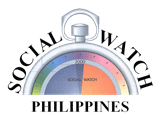Philippines
Published on Wed, 2013-07-31 21:35
This year Social Watch Philippines and the Alternative Budget Initiative or ABI will particularly scrutinize the Priority Development Assistance Fund or “pork barrel” and the transfers and allocations for the government’s Special Purpose Funds. Department allocations will also be assessed by the Initiative, particularly the allocations for health, education, agriculture, social welfare and the environment.
It’s that time of the year again when Congress debates and finalizes the National Budget for 2014. Budget hearings, pork barrels, agency allocations and special purpose funds will be, or should be, buzzwords in media for the next few months.
|
Published on Thu, 2013-07-18 11:38

Prof. Leonor Briones.
(Photo: SW)
|
After President Noynoy Aquino’s State of the Nation Address (SONA) on Monday, July 22, PNoy’s proposed budget for 2014 will be under scrutiny in a forum to be held at the University of the Philippines National College of Public Administration and Governance Assembly Hall. SW Coordinating Committee Co-chair, Former National Treasurer and budget expert Professor Emeritus Leonor Magtolis Briones will be the guest speaker in the forum.
Entitled “#Kabataan Roadtrip: Sa’n na Tayo Nakarating, Sa’n na Tayo Papunta?”, the public forum will focus on the government’s allocations and priorities for the youth. It is primarily organized by UP Samahan Tungo sa Progresibong Administrasyon (UP STPA), a socio-academic organization of public administration students of UP NCPAG. They are partnered with Social Watch Philippines, the People’s Public Finance Institute, the Alternative Budget Initiative, PALS NCPAG and the University Student Council.
|
|
The Philippines’ economic growth rates have averaged at 4.7 per cent since 2000, but only the elite few are benefiting. In the meantime, poverty has increased, reaching to 26.5% in 2009. It is not so much the size of the economic growth, but its nature that matters. This Southeast Asian country must craft a post-2015 development agenda that reclaims human rights as the normative framework, especially ensuring the right to education, health and decent work, and addressing the long-standing inequalities. This includes completing the agrarian reform, imposing a progressive taxation system and revitalizing the manufacturing sector to ensure the creation of quality jobs. A new international financial architecture is required to provide adequate policy space for countries like the Philippines to independently chart its own development agenda.
|
Published on Fri, 2012-12-07 13:00

Members of the Alternative Budget
Institute (ABI), a consortium of 60
non-governmental organizations
led by Social Watch Philippines,
called on citizens to vote only for
candidates supporting the MDGs.
(Photo: ABI-ENVI)
|
The Philippines needs a post-2015 development agenda that reclaims human rights as the normative framework, especially ensuring the right to education, health and decent work, and addressing the long-standing inequalities, concludes the report 2013 of Social Watch-Philippines. Economic growth averaged 4.7 per cent a year since 2000 in this South Asian country, but only the elites harvested the benefits, while poverty increased to reach more than one of every four Filipinos, says the study.
|
Published on Mon, 2012-11-26 08:05

“People over profits,” a global
demand. (Photo: Fibonacci Blue
/CC License)
|
“It’s not just money that’s required for achieving the MDGs. Another reason why we are so behind with them is the Philippines’ warped development. Yes, there is economic growth, but it has been accompanied by greater inequality, unemployment, underemployment and environmental degradation,” wrote Jessica Cantos, Co-Convener of Social Watch Philippines, in a report published by New Internationalist, newspaper specialized on issues of world poverty and inequality.
|
Published on Mon, 2012-09-10 08:38
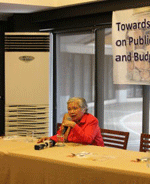
Leonor Magtolis Briones. (Photo:
Philippine Rural Reconstruction
Movement)
|
Social Watch Philippines and Alternative Budget Initiative are set to probe into President Benigno Aquino III’s proposed budget items for 2013 that are still unclear or not visible. “We have to be more vigilant as the 2.006 trillion pesos [47.74 billion US dollars] proposed 2013 appropriations is the first budget proposal to exceed the two-trillion pesos mark,” explained former national treasurer and Social Watch Philippines lead convenor Leonor Magtolis Briones.
|
Published on Mon, 2012-09-03 12:50
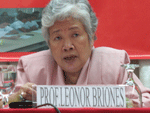
Leonor Briones. (Photo:
Freedom from Debt Coalition)
|
Social Watch Philippines is questioning some items in the 2013 budget submitted by the government to the Congress. The convenor of this national coalition of civil society groups, Leonor Briones, said there are lump sum appropriations called “special purpose funds”, which did not provide any breakdowns.
|
Published on Wed, 2012-04-18 08:36
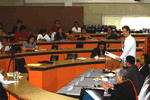
Launch ceremony of the project
last year, at the University of the
Philippines. (Photo: UCA News)
|
The non governmental organization Code: Reforms for Economic Development (Code: RED) and Social Watch Philippines launched a policy monograph on transparency and accountability in local governance, after several months of workshops in six municipalities to allow grassroots groups to get more involved in local public finance.
|
Published on Thu, 2012-03-15 13:45
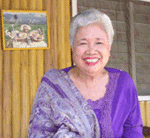
Leonor Briones
|
The impact of typhoons, earthquakes, climate change and other external factors make it difficult for the Philippines to reach its economic growth targets of 5 percent to 6 percent this year and 6 percent to 7 percent next year, warned Social Watch Philippines this week.
|
|
Addressing the vulnerability of the country’s already degraded environment is as important as making the economy grow. In addition, the Philippines long ago exceeded the 0.4 hectares per person required to satisfy the optimum food requirement/capacity. Decentralization efforts attempting to create growth centres away from Manila are still unable to break the elite and urban-centred structure of power and resources. The Government must strive to find ways – in cooperation with farmers, NGOs, the mass media, schools and the national agriculture research system – to achieve long-term food security and environmental sustainability.
|
SUSCRIBE TO OUR NEWSLETTER
Submit

|

